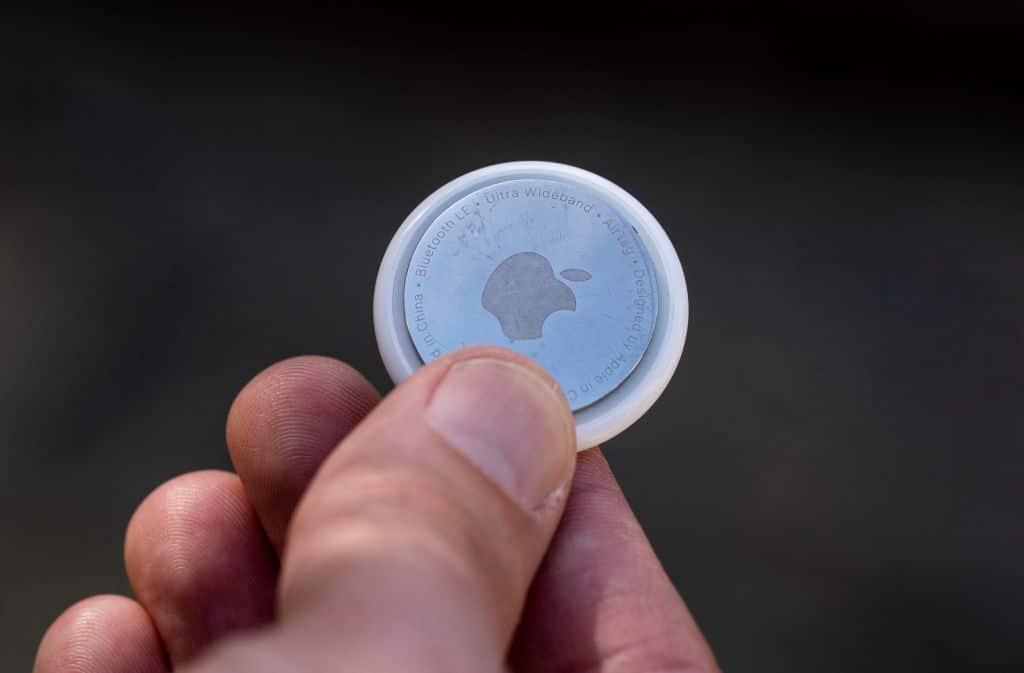Packages containing rifle parts hidden inside George Foreman Grills also contained Apple’s dime-sized location tracker, investigators say.
In November last year, Customs and Border Protection intercepted a package en route from Illinois to Israel. It contained a George Foreman Grill — innocuous enough. But when agents X-rayed the item and opened it up, they found rifle barrels wrapped in tinfoil and an Apple AirTag.
When Apple launched the dime-sized location tracking devices in 2021, they were pitched as a cheap piece of tech to help you keep tabs on your belongings, like luggage, keys and wallets. But AirTags and similar devices like Tile have also been put to use by criminals, most notably stalkers.
Now, CBP inspectors claim to have found evidence of another illicit use for AirTags: helping illegal weapons smugglers keep tabs on their shipments, according to a search warrant for an Apple iCloud account linked to the trackers that was obtained by Forbes.
Drug and gun traffickers have long used GPS trackers to keep tabs on shipments, either in order to ensure they reached their destination, or detect when they go missing. But while older trackers have proven bulky and unreliable, Apple’s AirTag is small, lightweight and efficient.
Loading...
“Like drug dealers, [weapons traffickers] want to make sure the load didn’t get ripped by police or somebody else,” said Brady Wilkins, a recently-retired investigator in Arizona. “If another group takes it or it gets seized, they can abandon it or know something is not right.”
Apple did not respond to requests for comment at the time of publication, but it has been attempting to curtail malicious uses of the AirTag over the last two years. One recent addition is a feature that warns users when an unknown tracking device is detected, via Bluetooth, on their person. “We condemn in the strongest possible terms any malicious use of our products,” the company wrote in a press release last year.
According to the warrant, the DHS Homeland Security Investigations unit traced the rifle barrel shipment back to a Palos, Illinois-based man, Amin Betuni. Records the government said it obtained from an unnamed online gun supplier showed Betuni had bought various AR-15 and Glock barrels. Investigators said that CBP intercepted a package containing what appeared to be those same parts, together with the grill and an AirTag, en route to a contact in Jerusalem, Israel. The warrant says the package’s shipping label stated it was sent from “Ameen Betuni” from a vacant lot next to a property owned by the suspect.
Border patrol in Israel, meanwhile, reported intercepting a different package containing gun parts also hidden inside a George Foreman Grill and an AirTag alongside, according to the warrant. That parcel had a return address for Betuni’s residence, the DHS claimed. Israeli officials also seized an additional FedEx shipment containing other gun components that were concealed inside of auto parts, investigators said. An AirTag was discovered in that package too.
Wilkins said that adding a personal property as return address would be a stupid mistake. “Criminals become complacent too,” he added.
In late December, law enforcement raided Betuni’s property, though he was not at home. Investigators suspected, however, they were being watched by security cameras in his home, as only ten minutes after police entered Betuni’s residence, one of his AirTag devices was mysteriously unpaired with his iCloud account, the DHS said.
Betuni was arrested in July and has been accused of shipping illegal Glock switches, which effectively turn a pistol into an automatic weapon, in the U.S. However, he has not yet been charged for sending gun apparatus to Israel or any other nation. In a recent filing, the government asked the court for an extension to the deadline for filing an indictment, as it was continuing to investigate Betuni’s conduct. The request was granted last week.
Others involved in the alleged scheme, but whose identities were unknown to the government, were also using AirTags as part of their operation to “smuggle goods from the United States,” the agent wrote in the warrant. No more information on the wider use of the Apple devices was provided.
The Department of Justice declined to comment on the case. Betuni’s lawyer didn’t respond to requests for comment.
It’s not just criminals who’ve found uses for the AirTag — law enforcement has too, even if it goes against Apple policy to use the tools for surreptitious surveillance. In March, Forbes found a warrant detailing the DEA’s use of an AirTag, after it placed one of the devices in a machine agents suspected was being ordered online to manufacture illegal narcotics.
Loading...
